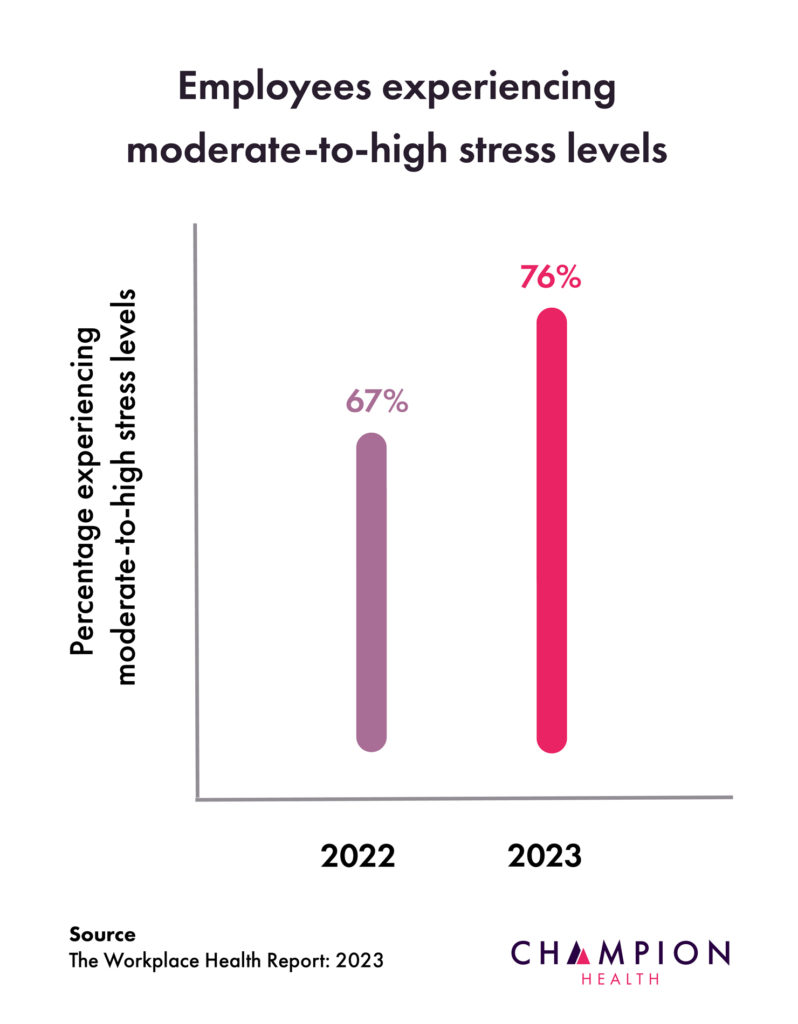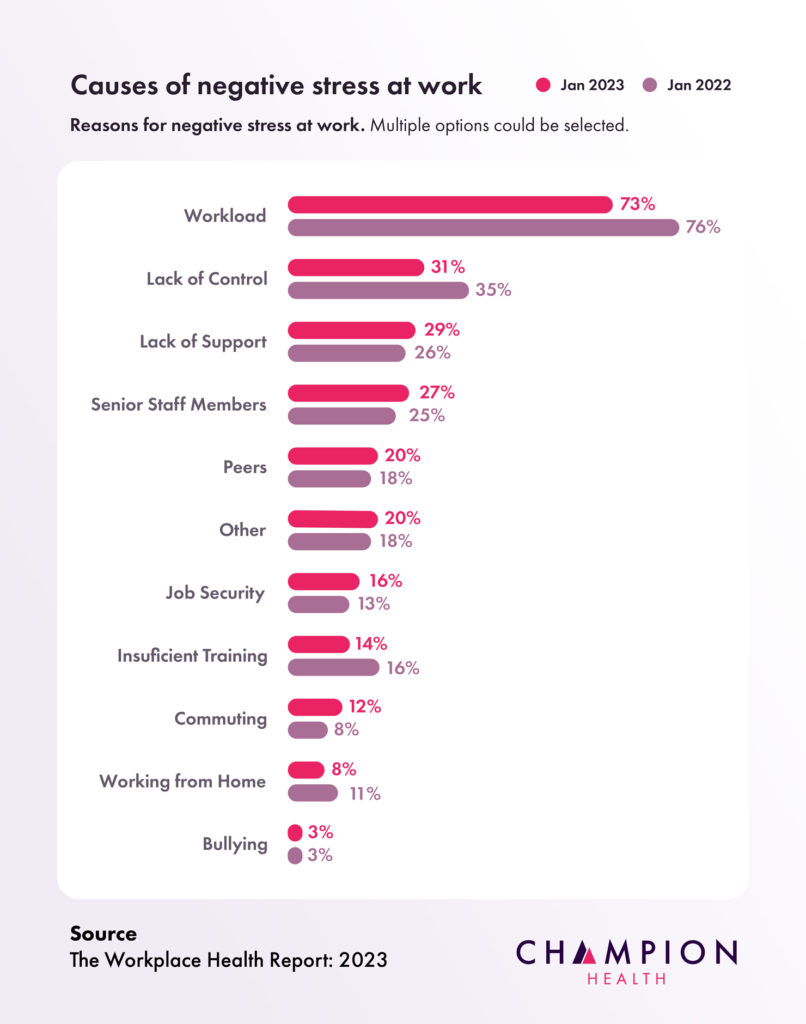Stress is the most common work-related illness in the UK and this already significant challenge has worsened with the cost of living crisis.
Our employee stress statistics reveal that 76% of workers are currently experiencing moderate to high levels of stress. Year-on-year, that figure shows a percentage increase of 13%.

Stress in work is often unavoidable and a certain amount of stress may be perceived as acceptable, or even healthy, by an individual. However, when that pressure becomes unmanageable, it becomes an issue which can damage both an employee’s health and their performance.
The prevention and management of work-related stress requires action on behalf of both the individual and the organisation, and managing the causes and spotting the signs of poor mental health are an integral part of this process.
To help you to be proactive about supporting those who are struggling, read this guide to find out the top 10 causes of stress at work. You’ll also learn how to identify the signs of stress at work.
- What is work-related stress?
- Why do organisations need to manage work-related stress?
- Top 10 causes of stress at work
- Signs of work-related stress
What is work-related stress?
Work-related stress is the response people have to work demands and pressures which exceed their knowledge and ability, or which are beyond their capacity to cope.
Stress in work is often unavoidable and a certain amount of stress may be perceived as acceptable, or even healthy, by an individual.
However, when that pressure becomes unmanageable it can cause burnout, damaging both an employee’s health and their performance.

Why do organisations need to manage work-related stress?
It is in employers’ interests to protect their employees from work-related stress for moral, legal and financial reasons.
Firstly, the moral angle. The wellbeing of their employees should be a priority for every organisation, as should providing every one of their employees with an equal opportunity to succeed, regardless of their mental health.
Then there are the legal considerations. Work-related stress is considered a disability if it has a long-term effect on the day-to-day activities of your employees. If this is the case, then it is the legal duty of organisations to provide reasonable adjustments to support those employees.
Finally, there is the business angle. Work-related stress is a huge cost for organisations, causing the loss of over 15 million days of work, and costing UK organisations over £5 billion annually.
By taking the right steps to support your employees, you can significantly reduce these costs, while cultivating a happier, more productive workforce.
Top 10 causes of stress at work
Employees tend to experience unhelpful stress in the workplace when their resources or capacity to work are exceeded by the demands placed on them.
Our own stress statistics below, as revealed within The Workplace Health Report, show what the top 10 causes of stress at work are:

Read on for a deeper look at each contributing factor for stress at work.
1. Excessive workload
According to CIPD, workload is the most common cause of work-related stress.
Our own findings correlate with those above and our data reveals that 73% of employees cite workload as a cause of stress at work.
If the work volume or the deadlines are outside of your capability, that is likely to become a major source of pressure.
2. Lack of control
Stress is strongly linked to the perception of control and our data ranks it as the second largest driver of stress at work, with 31% of respondents citing lack of control as a stressor.
Work-related stress is made worse when you feel that you have little control. Common areas beyond our control at work are:
- Work processes
- Decision-making
- Performance targets
3. Lack of support
Work-related stress is made worse if you (or your employees) are not receiving enough support from colleagues, supervisors or managers.
According to the data from The Workplace Health Report, 29% of UK employees cite lack of support as a cause of stress at work.
4. Senior staff
Managers play a vital role in the mental health of their employees. Managers who are critical, overly-demanding, over-bearing, unsupportive or bullying will inevitably be an enormous source of stress.
What they say, feel and do has a huge influence on their colleague’s emotional wellbeing, and our data supports that with over 1 in 4 (27%) of the employees we surveyed citing senior staff as a cause of stress at work.
5. Peers
Research shows that peer support at work can increase resilience in employees, so it’s no surprise that a lack of this support may cause increased stress.
Our research reveals that 20% of employees cite their peers as a cause of stress at work.
6. Other factors
There are innumerable other factors that could cause stress in our lives, so we included an “Other” option in our research, which was cited by 20% of our respondents.
Here are some other factors to consider:
- Poor working conditions – Your employees (and you) can become stressed if their work environment is uncomfortable, or influences unhealthy behaviours – like minimal movement
- Work relationships – Difficult or unsupportive relationships with colleagues can become a source of pressure at work
- Work/life balance – Enjoying a good quality of life outside of work is key to building a buffer against work-related stress
- Organisational culture – Your organisational culture plays a huge role in the wellbeing of your team, and how comfortable people feel about opening up when they are struggling
7. Job security
It may be surprising that job security ranks so far down the list, with just 16% of employees citing this as a cause of stress.
This finding suggests that it’s not enough for employers to simply provide job security. Instead, to really support employees’ stress levels, organisations and leaders must also provide other levels of support – from workload management to on-the-job training.
8. Insufficient training
Inadequately trained employees are likely to experience poor job performance and increased levels of work-related stress. Our research backs this up: 14% of employees cite insufficient training as a cause of their stress at work.
9. Commuting
As more people are recalled to the office, our data shows an increase in employees who are stressed by their commute.
Currently, 12% of employees cite commuting as a source of stress, which marks a 50% year-on-year increase.
Commuting is shown to interfere with patterns of everyday life by restricting free-time and reducing sleeping time. That said, it ranks far lower than other factors, implying that it may not be the most impactful area to address when implementing stress reduction strategies
10. Working from home
The pandemic forced organisations across the country to adapt their working policies to hybrid models. This has certainly not been easy for businesses and employees with 8% still citing working from home as a cause of stress.
Signs of workplace stress
1. Working longer hours
Look out for colleagues who are starting early, working late, and working through breaks. You may even notice these coping strategies within your own behaviours.
These are often signs of somebody who is struggling with their workload.
2. Visibly looking tired
It’s not unusual for people who are stressed to have difficulty sleeping at night. If a colleague regularly appears exhausted, it could be a tell-tale stress signal.
3. Increased absence
Look out for colleagues who suddenly start booking more time off than usual. Taking regular, short-term absences for an ongoing problem may be reflective of underlying stress.
4. Uncharacteristic behaviour
It is common for stressed individuals to act out of character. For instance, they might start turning up late, acting aggressively or being unusually quiet.
5. Decline in work performance
It’s incredibly difficult for anyone to perform at their peak if they are experiencing work-related stress. Lack of concentration, indecision and an inability to complete tasks are all signs to be aware of.
6. Irritability
Irritability and stress often go hand-in-hand. Snappiness, bluntness and being overly-aggressive are symptoms to look out for, particularly if these behaviour patterns are out of character.
7. Withdrawal from work socials
If work is the cause of someone’s stress, then they may begin to withdraw from anything to do with it, including out-of-office events like work socials.
8. Lack of punctuality
Timekeeping often becomes an issue where work-related stress is concerned. If a colleague suddenly starts missing deadlines, then it could be a sign that their workload is getting on top of them.
9. Increased sensitivity
If a colleague is stressed due to work, they may be more sensitive than usual, particularly when it comes to conversations surrounding work.
For example, they may find comments or jokes about their performance more upsetting than they normally would.
10. Lacking energy
Stress can take both a mental and physical toll. If you notice a colleague suddenly seems slow and lethargic, this could be a sign of work-related stress affecting their physical wellbeing.
Be proactive about supporting struggling employees
Now you know the top 10 causes of stress at work, but supporting employees doesn’t always have to be a reactive process.
The best employers will implement both proactive and reactive initiatives to support struggling employees.
By being on the lookout for potential causes or signs of work-related stress, you can stand yourself in good stead to be able to proactively support employees or colleagues with stress.
Once you have identified cases of work-related stress, you can work on the best way to support each individual employee.
By being proactive about supporting your employees, you can drive a compassionate culture throughout your organisation, which will play a significant role in helping employees to perform at their best.





